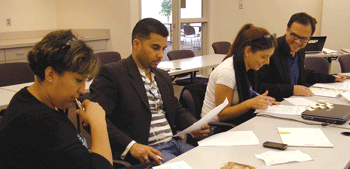Hamline University’s Middle East exchange program allows community leaders from neighboring countries to work together and share ideas
By ERIN ELLIOTT BRYAN / Community News Editor
For more than a month, 20 entrepreneurs from four Middle East countries lived and worked together in the Twin Cities. For the second year, Hamline University’s Education to Employment Fellowship Exchange Project — funded by a grant from the U.S. State Department — provided valuable business training to fellows who want to contribute to the economic development of their home communities.
The fellows, who came from Israel, Jordan, Lebanon and the Palestinian Authority, were recruited for their demonstrated leadership potential, after national searches were conducted with the assistance of the local cultural attaché offices of the U.S. Embassy. The 20 fellows have diverse backgrounds, and included mid-level administrators, community activists, journalists, scientists and nurses who were in Minnesota from May 14 to June 16.
Four Education to Employment fellows, including Arie Bornstein (far right), work on their business plans during a recent workshop at Hamline University in St. Paul. (Photo: Erin Elliott Bryan)
According to a press release, the program recognizes that conflicts and violence are “byproducts of a lack of economic opportunity.” The project’s overall hope is that “through practical training, private enterprise initiatives and constructive business leadership, job opportunities will grow in the aforementioned communities, political tensions will subside and a more hospitable environment will emerge to accommodate cultural, religious and ethnic differences, and nurture pluralism.”
Hamline University has teamed up with business partners in Minnesota to instruct the fellows in formal and informal settings. CEOs and other leaders of Minnesota-based companies, such as 3M, Cargill, Wells Fargo, HealthPartners and Minnesota Public Radio, taught and mentored fellows to create opportunities for gainful employment, and to impart these skills to others in their own communities.
Hamline contributed the experience of its business school and the expertise of its civic education faculty.
“Everyone is volunteering their time,” said Arie Zmora, the program’s administrator and director. “That was their contribution to community service.”
The fellows also participated in workshops on workplace diversity and visited with organizations that reflect the Twin Cities’ multicultural background.
In order to ensure the success of the project, representatives from the U.S. business partners will visit the fellows in their communities in August to assist them in effectively implementing their business plans.
“It’s great, it’s fascinating,” said 32-year-old Arie Bornstein, a journalist and Web site editor from Jerusalem. “I’m sitting with my Lebanese friend. It is illegal for us to talk to each other back home.”
Bornstein is developing the Ing Project, a Web site similar to YouTube that will address a broad clientele of tourists — from the young and old, to the religious and secular — with diverse interests. Starting with Jerusalem, users will be invited to upload one-minute videos of their favorite places in the city, including cafés, restaurants, neighborhoods, natural reserves and other hidden corners known only to locals.
According to his business plan, “the ultimate goal of the Ing Project is to make the entire Middle East — a region that suffers from an image problem as an unsafe place to visit — attractive for tourism.”
The site, he says, will provide information on city life in a new and authentic way: “Real people tell real stories about real places.”
Bornstein allowed that politics do find their way into conversations and tensions do arise among the fellows, but the Hamline program is still a valuable opportunity.
“We learn about each other, so that’s important,” he said. “We’re neighbors, but we hardly know anything about each other.”
For Mohammed Al-Bsoul, a 29-year-old clinical nurse from Irbid, Jordan, the program represents “the fastest step” to his future.
“I was searching for new opportunities and a new life,” he said. “Every time I read something about someone doing something, I realized my life is not suitable to me and I need to move up.”
Al-Bsoul’s plan is to open CARE Center (Community Adaptation to Recover by Education), a nonprofit center for health development and education. Irbid, Jordan’s second largest city after the capital of Amman, has existing hospitals in the city center, but they are difficult to reach for those who live in the remote area villages and the two United Nations refugee camps that surround the city.
Through the Hamline program and its partnership with Neighborhood Development Center (NDC), Al-Bsoul was connected to staff from Mano a Mano, an organization based in Mendota Heights that has set up similar health centers in Bolivia.
“If I stayed in Jordan, I would not have met with [Mano a Mano staff] and the idea would just be in my head. Now I can move forward,” he said. “There are four Jordanians in this group. If just one does our project in a suitable way, we will start a huge change in the Middle East and in Jordan.”
Tom Johnston, the recently retired senior exchange officer of the U.S. State Department, spent four days in Minnesota during the program. He said the fellows will “take back substantive knowledge that benefits those in their own country.”
“It only helps us and them,” he said. “This creates community in a way that no other U.S. government program can do… a creative cooperative community of those who will be leaders here and abroad.”
(American Jewish World, 6.22.12)





















